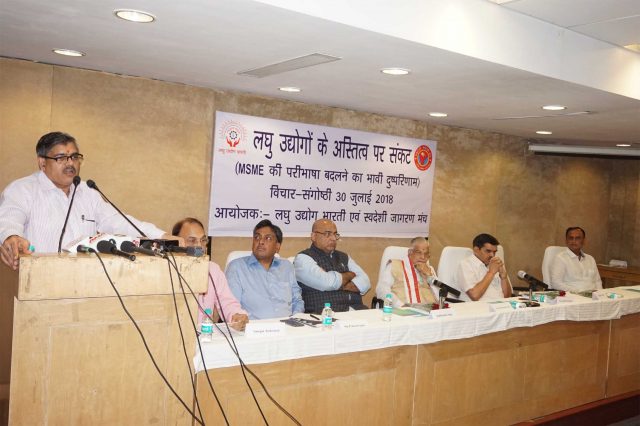
Small scale industries have been playing an important role in GDP growth, employment, exports and decentralisation. This is despite onslaught of globalisation, open trade policy causing flooding of Chinese products giving unjust competition, plethora of laws and complete absence of ease of doing business and numerous other problems including marketing, finance, technical etc.
Laghu Udyogh Bharati and Swadesh Jagaran Manch organised an interactive session on the implications on proposal of amending the definition of MSME on 30 July in New Delhi.
Need of the hour is that small industries are helped by support, co-operation and encouragement from the government. For this purpose, government of India carved out a separate ministry in the government with an objective of resolving issues and problems related to SSIs. However, in the era of new economic policy, due to obsession of political leadership and bureaucracy for globalization and corporate, several policies were made which were detrimental to the interests of SSIs and favoured big corporate at the cost of SSIs. After New Economic Policy was started implementing, it’s first victim was product based reservation for SSIs as reservation was successively withdrawn causing destruction of SSIs on a large scale. Along with this policy of preference for procurement was also drastically tweaked. Despite SSIs being in the priority sector category, they continued to face major problems in the availability of finance; and policies regarding marketing, technical assistance and Industrial estates became subject matters of history. Recently, with introduction of GST, facility of excise duty exemption of SSIs upto the rupees 1.5 crores was automatically withdrawn; however there was partial resolution of this issue, when SSIs were given relief by way increasing the scope of ‘Composition Scheme’ and reduction in the rates of GST on Small scale industries

In February 7, 2018, Union Cabinet decided to amend the definition of MSME. At present Micro units are those who employ plant and machinery of upto rupees 25 lakh, whereas for Small Scale Enterprises this limit is rupees 5 crores and for Medium Industries this limit is rupees 10 crores. However, now the basis of this definition is being tweaked from cost of plant and machinery to turn over basis, by introducing a bill in the parliament. According to the proposed definition Micro units would be defined as those units with an annual turnover of rupees 5 crores. For small units this limit would be rupees 75 crores and for medium units, this limit would be rupees 250 crores. This is our considered opinion that there is no reason or legitimacy for this change in definition of MSME.
We should not forget that even this concept of clubbing of Micro, Small and Medium enterprises in one category is also no good as nature and problems of each of their types of units are very much different and we need to keep non manufacturing enterprises separate for non-manufacturing enterprises, for promoting manufacturing in the country.
Why this Change is Illegitimate?
Sometime back, Government of India constituted a One Man Committee under the Chairmanship of Prabhat Kumar, Ex Cabinet Secretary in the union government. This Committee too recommended to keep the definition of MSME on the basis of cost of Plant and Machinery, though bureaucrats had recommended for change the same to turnover basis, which Prabhat Kumar Committee had summarily rejected. Therefore this amendment in definition of MSME is not only against real stakeholders like small scale enterprises but also against the recommendations of the Committee constituted to make recommendations for a National Policy for MSMEs. We are of the firm opinion that this definitional change would be detrimental to the interests of small scale industries. It’s notable that nowhere in the world we find definition of MSMEs based purely on turnover. It’s important and interesting to note that 98 percent of small units have a turnover of less than rupees 15 crores. That means, with this change in definition hardly 2 percent would attain the status of MSMEs at the cost of 98 percent. This change in definition would incentivise small industries entrepreneurs to shun their industries and become importers/traders or assembly units and enjoy the benefits of MSMEs particularly preference in government procurement. It is feared that with change in definition, small and medium enterprises would be able to enjoy the benefits of MSME by shifting from manufacturing to trading and assembling. Those who are running industries would be inclined to become traders. It is well known that small industries’ development is key to employment generation in the country, thus this definitional change would act against make in India and employment generation.
In the era of globalisation due to anti small scale industries’ policies, small industries are fast vanishing and Indian markets are full with Chinese products. Domestic industrialists are forced and lured to become traders and assemblers and are selling all Chinese products. Small entrepreneurs, are able to survive by way of whatever little incentives are available to them because big industries do not come under the category of MSME. However, with this change in definition they will lose all that advantage. Sufferer would be make in India dream of the nation and particularly our youth. It’s unfortunate that definition is being changed by bringing in bill in the parliament due to misguidance of bureaucracy. We should not forget that at an earlier occasion when definition was tweaked favourably and limit of investment in plant and machinery was lowered by then government under Atal Bihari Vajpayee Prime Ministership from 3 crores to one crores, small industries benefitted enormously and number of workforce in self employment increased from 54 percent to 57 percent (NSSO).
We urge upon the Prime Minister and MSME Ministry to immediately halt the process of passage of the bill in the interest of the small industries, make in India, entrepreneurship development and our youth with a dream of working for India.
Courtesy: VSK Bharat














